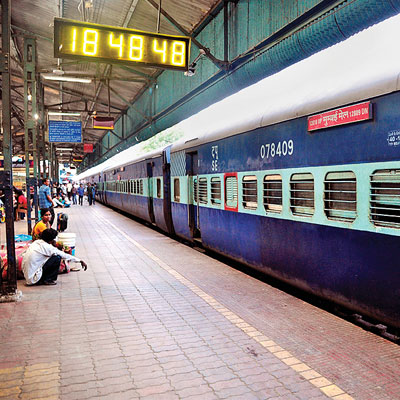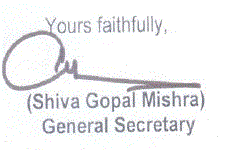Collecting under the banner of the All India Railway Engineers Federation (AIREF), the engineers said that their protest would continue till Wednesday (December 2).
Representational image
Railway engineers from across the country gathered at the Jantar Mantar area of central Delhi on Tuesday to voice their objections to the recommendations of the Seventh Central Pay Commission.
Collecting under the banner of the All India Railway Engineers Federation (AIREF), the engineers said that their protest would continue till Wednesday (December 2).
Engineer Sanjib Kumar, the president of the AIREF, told ANI, "Due to the faulty policies made by railways and erroneous report given by Seventh Central Pay Commission, the railway engineers have been frustrated seriously for which there will be a tremendous threat to railway safety in the future".
He further stated that the AIREF represents about 80,000 degree and diploma engineers of Indian Railways, all of whom play a crucial role in ensuring the safe and efficient running of trains; construction and production; design, repair and maintenance of tracks, bridges and buildings; rolling stock, locomotives, coaches, electrical services, OHE, signals, telecommunications.
Kumar also revealed that the railway engineers also assume the responsibility for the safe movement of 23 million passengers daily.
The striking railway engineers said that they have submitted a charter of 27 demands for the government to implement, failing which they warned that their strike could turn into an indefinite one.
The demands are as follows:
1. Group-B/Gazetted status to all railway engineers (JE, SSE, SE/IT, CMA/CMS & DMS/CDMS) as per DOPT Gazette Notification no-605 dtd. 09.04.2009 as implemented in all other departments of Central Government.
2. Recognition of All India Railway Engineers Federation (AIREF) and its affiliated Zonal Railway Engineers Associations as per Khanna Committee recommendation.
3. To remove anomaly of 6th CPC: Grant upgraded Pay matrix equal to Rs. 5400 (PB-3) to JE and Rs. 6600 (PB-3) to SSE with standard designation of Assistant Engineer.
4. Time bound promotion from JE to Junior Administrative Grade Officer.
5. Scrap new pension scheme in Railways or make it optional.
6. Grand Technical Allowance @ 30% to all railway engineers.
7. Inclusion of father and mother in definition of family as per Indian culture.
8. Remove anomaly of Modified Assured career progression (MACPS)
a. Counting of apprentice period for MACP for regular service since it is qualifying service for pension and increment.
b. Financial up-gradation under MACPS to the directly recruited Graduate Engineers (head Draftsman) Considering entry Grade Pay as Rs. 4,600/- for the purpose of MACP to all the directly recruited Engineering Graduates and treating GP-4200 to diploma engineers recruited as Asstt Draftsman in Design/Drawing Cadre and other Cadres, those recruited one stage lower at that time.
c. Third financial up-gradation under MACPS on completion of 20 years of service from the first promotion or 10 years after second promotion or 30 years after regular appointment whichever is earlier.
9. Stop immediately implementation of integrated seniority as per Rly Bd. Letter no. RBE 92/2015 for the purpose of promotion/selection to Group-B posts.
10. Open a promotional channel to qualified loco pilots to become JE / SSE through LDCE / GDCE.
11. Provide entitlement in Tatkal ticket through privilege / duty passes/ PTOs.
12. Provide e-ticket facility to Railway employees on pass/ PTOs / e-pass.
13. Remove restriction of no. of tickets in Rajdhani/ Shatabdi / Duranto express trains on passes / PTOs.
14. Provision of accidental insurance of Rs. 20 lakhs to all railway engineers.
15. Provision of LTC to railway engineers on inland or foreign tours once in two years.
16. No corporatisation in Indian Railways and its Production Units.
17. Provision reimbursement of tuition fee of children studying in higher education ( Engg. / Medical / MBA etc)
18. Provision improved rest house facilities at all major railway stations for Railway Engineers or provide hotel / retiring room facility as admissible to all Central Govt. employees.
19. Rename the training institutes as Railway Engineers' Training Institutes instead of Supervisors' Training Institutes.
20. Ensure CUG facilities to all Railway Engineers and increase the CUG utility amount to minimum Rs 500/- for JE and equivalent and Rs 1000/- for SSE and equivalent.
21. Provide brief case to all Railway Engineers irrespective of any condition.
22. Set up technical library in all divisional / HQ office including workshops, loco sheds under functional management of Engineers Associations of the unit.
23. Stop unnecessary inspections on Sundays & holidays by higher officers except during unusual incidences like accidents, derailments. etc.
24. Ensure compulsory weekly rest to field staff and to implement 8 hours duty schedule, sanction additional night duty posts of Engineers where it is not yet exists
25. Fill up all existing vacant posts to stop short-cut method.
26. Create new posts as per new assets.
27. Increase exemption limit Income tax to Rs 8 Lakhs and exemption of all allowances from Income tax.
Maintaining that the seventh CPC has ignored all factors i.e. education, duties and responsibilities of the railway engineers, and only concentrated on upgrading the pay structures of non-core, non-technical and non safety categories, Engineer Sanjib warned that it will affect seriously the government?s dream project to run a bullet train in the future.
He said that when several railway safety committees such as the Justice Khanna Committee, the Justice Wanchoo Committee and the Justice Sikiri Committee have categorically recommended giving railway engineers separate recognition in view of their separate nature of duties, responsibilities, mode of recruitment and training etc., why was this government shying away from granting it.
"We have had a good meetings with the commission at several places at different cities of the country. The chairman has assured to give justice by giving Group-B status and good pay structures with perks. But now, we have found that the commission has betrayed us", Engineer Kumar said.
AIREF Secretary General Engineer Ashok Kumar Tyagi described the lot of railway engineers as disappointing and unfortunate. "It is the worst ever pay commission report among seven pay commissions", he maintained.
A.V. Swamy, Member of the Rajya Sabha from Odisha and a member of the Parliament's Standing Committee on Water Resources, and a former engineer, justified the railway engineers protest. He said, "When the rights and demands of railway engineers are denied, the chance of technical advancement of the railways is remote".
Lok Sabha Member B. Majhi and ex-engineer-in-chief of E. Co. Railways, said, "Pay commissions have continuously ignored the just demands of the railway engineers".
Rajya Sabha Member A.B. Rapolu said, "The Railway Board has denied justice to its technocrats. Junior engineers and SSEs must be granted Group B gazetted status at par with other central government departments".
The AIREF said that the railway ministry has been giving only conventional replies and this would eventually affect the safety and economy of the railways seriously.














